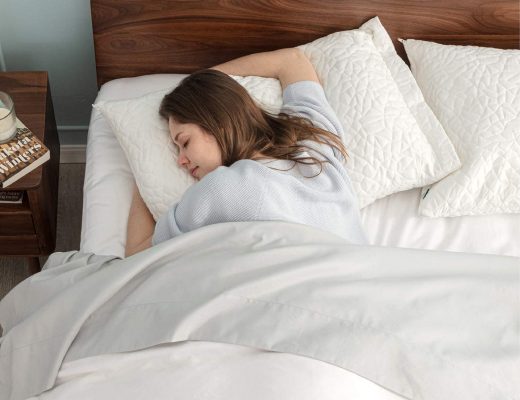Some people put a lot of stock in what direction they sleep in. Those who choose to align their bodies in a specific direction may do so based on cultural superstition or alleged scientific fact. While the reasons why and the benefits of facing the “right” direction when one sleeps can vary considerably; the one common thread that runs through them all is that proper alignment has health benefits and that disregarding the correct position can be detrimental to your health.
Is there a “best” way to face when sleeping? According to science, no: regardless of whether you face north, south, east, or west, your sleep will be the same (barring obstructions in your sleep environment, of course: if you sleep facing the direction of a bright light source you’ll have trouble falling asleep). Despite numerous studies concluding there’s no real difference, different beliefs persist.
For this article, we’re going to dive deep into how the idea of sleep directional alignment has continued to flourish, what ideas drive it; and what science specifically has to say about them.
It’s All About Your Head
Questions regarding the alignment of your body while you’re sleeping are concerned with your head; not your body as a whole. Of course, to sleep comfortably will have our body and head inline with each other, so it’s still accurate to discuss it as body alignment. But the magic (or the science, as some allege) happens all in your head.
When we look at the following beliefs; keep in mind that what’s being discussed in the direction that the top of your head is pointing it. However, depending on what sources you’re consulting, the language can be somewhat more complicated. For example, it’s not uncommon for some sources to refer to your body position as the direction that your bed is facing rather than directly referring to your body itself.
Feng Shui
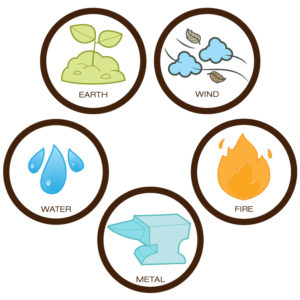 Two beliefs dominate the discussion of sleep direction. The first is the one that most Westerners are probably familiar with (or at least, they think they’re familiar with). Feng shui is an old Chinese practice concerned with drawing energy into your life based on the orientation of objects and yourself based on the five elements.
Two beliefs dominate the discussion of sleep direction. The first is the one that most Westerners are probably familiar with (or at least, they think they’re familiar with). Feng shui is an old Chinese practice concerned with drawing energy into your life based on the orientation of objects and yourself based on the five elements.
At this point, you might be wondering: what is the fifth of these elements? Classically, there are only four: earth, wind, water, and fire. Feng shui adds metal to the mix, though some refer to it as space instead. Much of feng shui is concerned with the distance between objects and where they face based on the properties of these elements.
For many of us, feng shui is little more than a form of decorating and arranging a room. According to the belief system, certain objects need to be placed facing specific directions to promote good chi (or ki, a form of energy) flowing into space and those inside of it. Many books have been written about the practice solely from that perspective, but its history and use it more complicated (we won’t be getting into the full details here—this piece would get quite long if we did).
Concepts in feng shui are somewhat murky, for numerous reasons. First and foremost, one of its primary textual sources is lost to history. Second, feng shui has multiple branches or schools, making a “right” or “wrong” belief difficult to determine. Finally, feng shui has adapted and evolved numerous times throughout its history.
Despite these complications, one of the most prominent beliefs in various forms of feng shui is that your bed is the most important object inside of your home. When you’re sleeping, your body is in a state of yin, making it receptive to energy. With different energies coming from each orientation, the direction you sleep in is seen as critical as it will influence your waking hours.
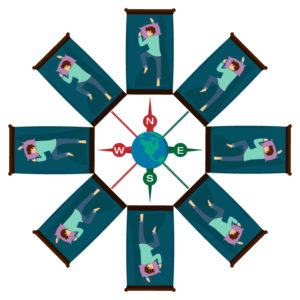 Feng shui has many rules for where you should place your bed concerning other objects in the room as well as your home’s architecture. But where it gets complex is in how you should orient your bed (and thus yourself) when you’re sleeping. This single detail is present in most variations of the practice, but the specifics can vary considerably. Here are just a few:
Feng shui has many rules for where you should place your bed concerning other objects in the room as well as your home’s architecture. But where it gets complex is in how you should orient your bed (and thus yourself) when you’re sleeping. This single detail is present in most variations of the practice, but the specifics can vary considerably. Here are just a few:
-
- Head pointed southward can be found as a recommendation in some of the oldest surviving feng shui texts. Unlike other principles of alignment in feng shui, which deal with channeling different types of energy, this is based more on aligning yourself with pleasant breezes; which were thought to come from the south.
- Head pointed anywhere but westward. This one incorporates science into feng shui (which is somewhat unusual; its core principles rely on folk beliefs). The idea is that the rotation of the Earth (from east to west) will force your blood towards your head if it is pointing towards the west, making sleep difficult.
- Any direction but north or south. According to feng shui, energy flows from the northern magnetic pole to the southern pole. Sleeping in alignment with the poles is thought to disrupt your energy and your sleep.
- In a direction depending on when you were born. Complicating all of these is the idea that each season has a set of corresponding sleep directions that will utilize specific energy to keep them balanced.
Does It Work?
Outside of possible placebo effects, no, there’s no evidence supporting feng shui. It has persisted in part because of tradition, at least in China. It continues to be popular today, both as a part of the culture and a genuine belief. Unfortunately, it simply doesn’t work.
Chi, the positive and negative energies that form the basis of feng shui, can’t be demonstrated or observed by science. As for the rotation of the Earth and its magnetic fields, they don’t have the impact on you that feng shui describes. These misconceptions are understandable for an ancient belief system but don’t mesh with what we know about modern science.
Vastu Shastra
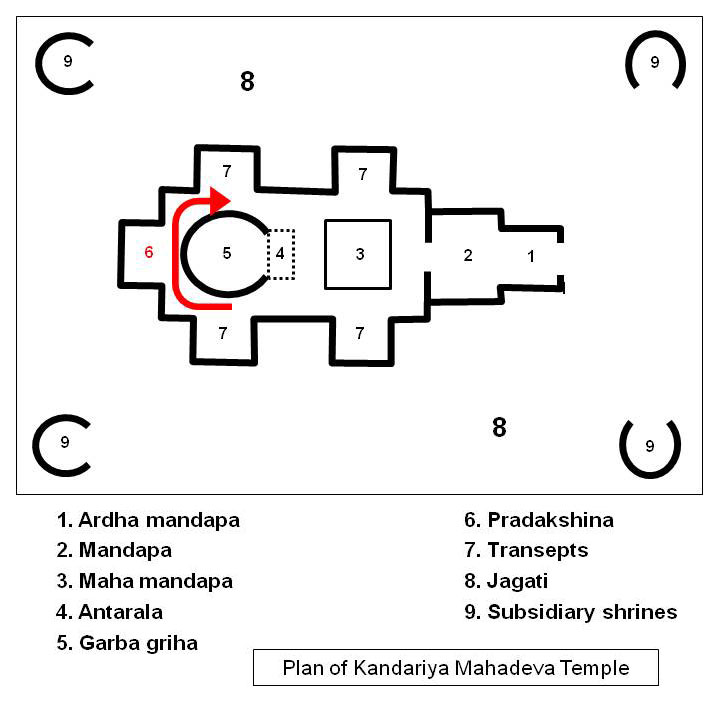 Though it has many similarities to feng shui, Vastu Shastra isn’t directly related to it. Originating in India, Vastu Shastra can be translated as “science of architecture”. While it is partially based on getting the most out of rooms as well as buildings, it is not entirely scientific; as it incorporates elements of Hindu spiritual beliefs into its guidelines.
Though it has many similarities to feng shui, Vastu Shastra isn’t directly related to it. Originating in India, Vastu Shastra can be translated as “science of architecture”. While it is partially based on getting the most out of rooms as well as buildings, it is not entirely scientific; as it incorporates elements of Hindu spiritual beliefs into its guidelines.
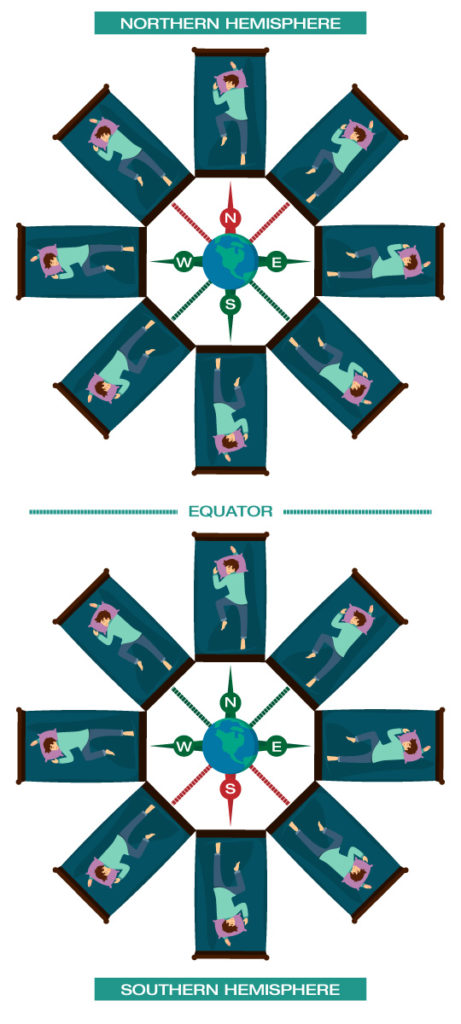
The principles of Vastu Shastra are quite old, and as such can be seen in ancient buildings (like temples) in India. Its influence has carried into the modern-day, though appears to have less differing schools of thought than feng shui. It’s still very common to find practitioners, though it’s not as popular in the West as its Chinese counterpart.
Vastu Shastra’s focus on physical space extends to the size and shapes of rooms. The orientation of doorways, windows, and even furniture is thought to invite progress or disaster depending on whether or not you follow the system’s guidelines. Not surprisingly, this extends to how you orient your bed as well.
Vastu Shastra advises different directions for different benefits:
-
- Sleeping with your head pointed to the north or south is considered the worst position depending on what hemisphere you’re in. Essentially, you’ll want to sleep with your head pointing towards the south if you’re in the northern hemisphere. And towards the north, if you’re in the southern hemisphere. This is based on the idea that if your northern end (your head) is pointing towards the nearest magnetic pole; it will disrupt blood flow and cause health problems.
- Sleeping with your head pointed towards the east is believed to boost cognitive functions like memory. It’s advised for students and those in middle age.
- Sleeping with your head towards the west is thought to be good for your standing in society, bringing you career success and fame.
Does It Work?
Like feng shui; Vastu Shastra’s foundation is in the pseudoscience of five elements and should be considered a folk practice at best. Its biggest flaw in terms of sleep is a misunderstanding of the Earth’s magnetic poles; and how they interact with the iron in your blood. The fear is that repulsion by the magnetic poles can cause physical harm or distress through negative energy. The iron in your blood, however, isn’t affected by the magnetic poles or magnetism in general due to the presence of oxygen.
Changes are observable when using magnets as strong as those in MRI machines. But that is substantially stronger than the Earth’s magnetic fields. Likewise, tests that have been done on blood in lab settings (using similarly strong magnets) used tubes significantly larger than veins in our body. The observed effects in red blood cells; which are mildly magnetic, but the size difference in tubes means that the changes aren’t replicable in the human body.
Both Vastu Shastra and feng shui do make recommendations for sleep habits that are great for developing better sleep hygiene, but these have nothing to do with orienting yourself in a specific direction.
So What Does Science Recommend?
Another reason that these folk beliefs about sleep remain so dominant is that science hasn’t directly addressed the question of if a specific orientation is better for sleep than others. While it can dismiss the influence of the Earth’s magnetic fields as playing a role. They aren’t strong enough to influence the iron in your blood—other possibilities haven’t been explored en masse.
Interest did pickup in 2008, however, with the publication of a German study. To see if humans will naturally orient themselves in a specific direction when they sleep; researcher Hynek Burda sought to use Google Earth images to find the tents of campers and determine how they were oriented. It was quickly apparent that identifying tents this way was incredibly difficult, and so the focus of the study changed.
While searching for tents Burda was able to easily identify cows in nearby areas. By locating thousands of cows in different herds across the planet, he discovered that most slept and grazed in a north-south orientation. Somehow, this had gone unnoticed up to this point. The same behavior was noted in herds of deer as well.
Other animals are known to use what’s described as a magnetic sense to orient themselves. Some birds, for example, will use it to navigate while flying. Unlike animals who use this magnetism to navigate, researchers aren’t sure what benefit cows and deer get from eating and sleeping this way.
The discovery renewed interest in the idea of literal animal magnetism and if humans are influenced in the same way. However, other studies pursuing Burda’s original idea have yet to reveal much more. While other areas of sleep are being investigated by science; magnetic influence on it seems to be left in the wayside. There have, however, been two sleep studies regarding sleep orientation worth noting.
A 2015 study published in The International Journal of Indian Psychology followed a group of one-hundred and fifty-three university students to chart the quality of their rest based on how they oriented themselves during sleep. The results, which you can read here, found that those sleeping in an east-west orientation reported experiencing the most difficulty sleeping. It goes on to recommend sleeping in a north-south orientation; citing fewer reports of sleep disturbance and longer sleep times but also concedes there aren’t many other studies to compare and contrast it to; so it shouldn’t be held as conclusive or definitive.
Another study, this one from 1987, found that those who sleep in an east-west orientation have shorter REM cycles than those who don’t. This may explain the occurrences of disturbed sleep in the previously discussed study; as the REM cycle of sleep is the most restorative for our bodies. The same results have been found in other, more recent studies; but it’s yet to reach the state of scientific consensus where recommendations can be made.
So if science can’t agree on a single best direction to sleep in, what should you do? The answer is simple: sleep in any way that feels best for you. As long as you feel well-rested when you wake up, free of aches and pains, then that’s what matters.
While science says there’s no harm in orienting yourself in certain directions when you sleep; there are more practical reasons to avoid facing in the same direction as some objects in your room. You may feel safer facing the door, for example. Likewise, being near active electronics may disrupt your sleep if they emit bright light or noise. Consider your immediate environment—and common sense–when determining the orientation of your body when you sleep.




